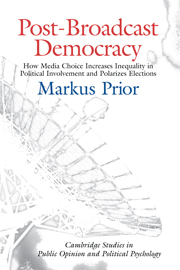 Post-Broadcast Democracy
Post-Broadcast Democracy Book contents
- Frontmatter
- Dedication
- Contents
- List of Tables
- List of Figures
- Acknowledgments
- 1 Introduction
- 2 Conditional Political Learning
- Part I The Participatory Effects of Media Choice
- Part 2 The Political Effects of Media Choice
- 6 Broadcast Television, Partisanship, and the Incumbency Advantage
- 7 Partisan Polarization in the High-Choice Media Environment
- 8 Divided by Choice: Audience Fragmentation and Political Inequality in the Post-Broadcast Media Environment
- References
- Index
- Books in the Series
8 - Divided by Choice: Audience Fragmentation and Political Inequality in the Post-Broadcast Media Environment
Published online by Cambridge University Press: 05 July 2014
- Frontmatter
- Dedication
- Contents
- List of Tables
- List of Figures
- Acknowledgments
- 1 Introduction
- 2 Conditional Political Learning
- Part I The Participatory Effects of Media Choice
- Part 2 The Political Effects of Media Choice
- 6 Broadcast Television, Partisanship, and the Incumbency Advantage
- 7 Partisan Polarization in the High-Choice Media Environment
- 8 Divided by Choice: Audience Fragmentation and Political Inequality in the Post-Broadcast Media Environment
- References
- Index
- Books in the Series
Summary
Few people could deny that life would be different without television. Most Americans with cable or satellite television would agree that greater media choice has affected their evenings. Many Internet users might not remember when they last picked up a phone book or went to a book store. It may be a cliché that new media change people's lives, but with regard to many routine tasks, it is also a truism.
And yet, political scientists use the same models that were used twenty years ago to explain political behavior. Judging by their models, most political scientists believe that politics would not be so different without television, that they can safely ignore the expansion of viewer choice that came with cable, and that the Internet is little more than a newspaper without the paper. The media environment is barely on the map of political science. Studies that state explicitly whether and how political behavior would be different in a different media environment are few and far between.
This study has demonstrated that changes in the media environment affect politics. The advent of television changed news exposure, political knowledge, and turnout. Cable television and the Internet changed them again. The political relevance goes beyond political involvement. Changes in the media environment caused congressional incumbents to do better in the 1960s and elections to become polarized in recent decades.
In this chapter, I briefly summarize the key findings as well as some limitations of this study.
- Type
- Chapter
- Information
- Post-Broadcast DemocracyHow Media Choice Increases Inequality in Political Involvement and Polarizes Elections, pp. 255 - 288Publisher: Cambridge University PressPrint publication year: 2007


